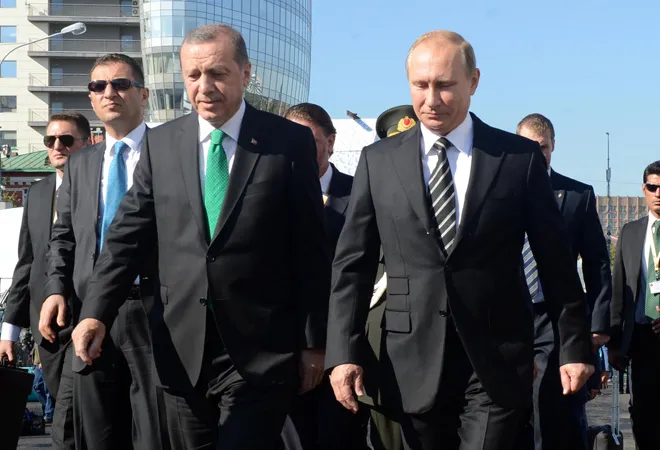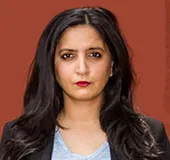-
CENTRES
Progammes & Centres
Location
Neither Turkey nor Russia is abiding by the ceasefire deal in Idlib.

It is now clear that when Russia and Turkey signed a ceasefire deal on the last rebel-held enclave in Idlib, Syria, ostensibly to avoid a humanitarian catastrophe, neither of them was entirely honest.
On the one hand, Russian planes have resumed intense bombing of civilian targets in the last month killing more than three hundred people. On the other, Turkey has sent reinforcements to help Ha’yat Tahrir al-Sham
Under the agreement, Russia was supposed to guarantee the ceasefire to ensure Idlib's three million inhabitants do not come under attack by the Syrian government. At least half of the people were already displaced from different parts of Syria in Russia-mediated reconciliation deals and sought refuge in Idlib.
Turkey, meanwhile, was expected to oversee the disarming of jihadist groups such as HTS, still believed to be linked to Al Qaeda and rein them in. Neither has abided by the Sochi agreement as the deal signed in September is referred to.
Russia has undertaken relentless bombing of areas not just controlled by the jihadist groups but also those under the National Liberation Front
While Russia's targeted attacks on civilians have no justification - the question of Turkey’s failure to contain the jihadists has remained unanswered and received little attention. Conversations with HTS insiders and top commanders of Turkey-backed rebel groups revealed that Turkey is indirectly and sometimes directly, supporting HTS and using it as a bargaining chip in wider negotiations with Moscow.
There are numerous reasons for Turkey to let them operate with impunity even if they are jihadists. Firstly, the fact that they are ideologically driven unlike the generally less ideological if broadly identified Islamist rebel groups of the NLF, makes them a more effective fighting force against Assad. Turkey fears that even if the HTS was weakened in line with the agreement, Idlib would be left effectively defenceless and in a weaker position to negotiate a final political settlement with the Syrian government.
Furthermore, HTS's fighters are united under one leader which is Abu Mohammed al-Jawlani, unlike the other rebel groups which are often quarrelling among each other for control of the territory and leadership. "This makes it easier for Turkey to get its orders executed with less headache," one HTS fighter in Idlib told me.
Secondly, Ankara needs Idlib to hold out against the Syrian government and the Russians in the hope that it could be leveraged against its own ambitions to create a safe zone in the east where the Kurdish groups to which it is so opposed - PKK affiliates like the YPG - would not be allowed to operate.
After a back and forth on the presence of American troops in the northeast, who have been aiding the Kurdish fighters in their battles against the ISIS, Trump finally announced that 200 American soldiers will stay back in Syria.
This has altered Turkish President Erdogan's calculations significantly. The continued presence of the Americans on the ground strengthens the Kurdish YPG. Several western diplomats in conversations with this author have said that Turkey would rather strike a deal with the Russians under which a buffer zone could be established on its border with Syria in the north-east, even if that meant that the Syrian government would reclaim control of those territories. In such a scenario, Turkey would deal with the Russians and likely seek joint Russian-Turkish patrols in the buffer zone. Although in Idlib's 15-20 kms ceasefire zone, these patrols never happened. They were supposed to.
However, at the moment, there is no clarity on how these negotiations would pan out. Turkey, hence, wants to keep the HTS intact and strong so it could leverage it at a later stage. The HTS has repeatedly attacked Russian bases in Syria and is one of the groups that Moscow is determined on obliterating.
Finally, HTS controls the border with Turkey raising fears that if it took on HTS militarily, the violence would spill into its territory. Turkey is home to over three million Syrian refugees, and instead wants to resettle them in neighbouring Idlib, for which it would need to coordinate with the strongest militia on the ground, HTS.
In the longer run, western diplomats fear, the survival of HTS could become a threat to the west itself. They said Idlib may eventually become a haven for jihadists committed on spreading terror abroad, even if at the moment the group insists it is only focused on the Syrian regime. This means that western diplomats, while understanding of Turkey’s desire to have a comprehensive settlement in Syria that reflects its own interests, are concerned that Ankara is not fulfilling its part of the anti-jihadist bargain.
For Russia and Turkey, Idlib is a playground. Neither wants an all-out offensive. Turkey is petrified of the refugee exodus whereas Russia wants the west to pay for Syrian reconstruction - which it would not be in a position to ask for, if Idlib's bombings forced Syrians to move towards Europe. It also does not want to poke Turkey beyond a point as Ankara has agreed to sign big defence deals with Moscow such as the much contested S-400 missile system.
The views expressed above belong to the author(s). ORF research and analyses now available on Telegram! Click here to access our curated content — blogs, longforms and interviews.

Anchal Vohra was a Fellow at ORF. She writes on contemporary developments in West Asia and on foreign policy.
Read More +